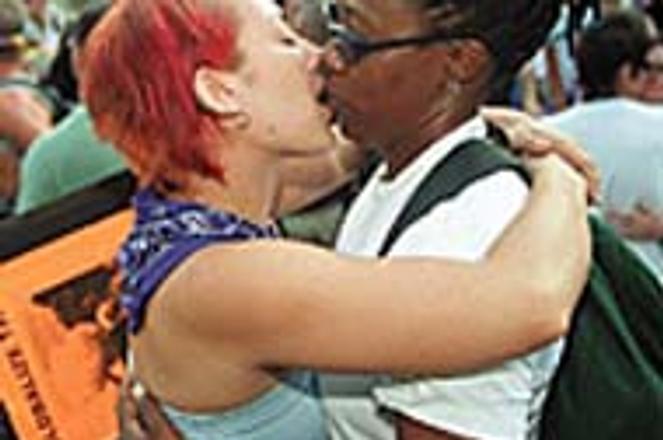Slovak gays say open expressions of sexuality, like this one from a US gay pride march, are impossible here.photo: TASR
Gloomily shaking his head, 25-year old homosexual Slovak resident Juraj [not his real name], pushed his glasses up the bridge of his nose with a deep sigh. He had just re-read anti-homosexual comments made August 17 by Slovak Justice Minister Ján Čarnogurský and his party-mate Alojz Rakús.
"It's not a surprise at all, but it depresses me and makes me want to leave the country," said Juraj. "I'm jaded and I simply want to get out of here, go to a big city in the West and lead a normal life."
Juraj's depression is the result, he said, of the fact that he lives in a country where high-profile politicians are free to say that same-sex marriages "degrade the family" (Čarnogurský), and that homosexuality is cureable; indeed at a 52% rate (Rakús). Politicians say these things, Juraj continued, because the citizenry generally agrees with such statements.
"Slovaks don't accept homosexuals," he said. "They think it's immoral, that being gay is wrong."
Leaders of the Slovak gay community also acknowledged being "injured and dissapointed" by the recent statements. But instead of giving up the fight, they say they will encourage homosexuals like Juraj to challenge stereotypes and take a more active role in championing gay rights.
Jozef Greč, an activist with the gay rights organisation HaBiO and a spokesman for the 'Otherness Initiative', said that Čarnogurský - who declared that no law giving homosexual partnerships the same rights as heterosexual marriages would be passed "as long as I am the Justice Minister" - had motivated his group.
"This has confirmed that our movement, our attempts to achieve change, is important, and it has motivated us to be more active," Greč said in his tiny Bratislava office on September 6. "Čarnogurský helped us. We are now one of the biggest topics in Slovakia, and the media can cover us in a normal way. We want to explain ourselves so that people will understand who we are."
He continued: "Slovaks are only starting to accept us. It's not easy to say the situation is getting better, but I can say that it is no worse than it was 10 years ago. Attitudes are starting to change."
Ján Bunčák, a sociologist at Comenius University, agreed that the time for change had come. Society, he said, had become much more accepting of homosexuals since communism fell in 1989, adding that temporary setbacks were part and parcel of significant social change.
"In sociological theory, there exists an idea that revolutions occur only after a situation ebbs and flows," he said, comparing Čarnogurský's statements to a case of 'two steps forward, one step back'. "But things have changed. The situation is improving and homosexuals will definitely be more accepted in the future."
In order to achieve change, Greč said that two things must happen: the gay community themselves must "come out of the closet", and heterosexual Slovaks must understand the true meaning of democracy.
"I would say that 80 to 90% of Slovak homosexuals are still in the closet," he said. "But if we want change, we must be more open. For example, we have lawyers working on the partnership law [which would give homosexuals in long-term relationships the status of "registered partners" - a draft has been ready since 1997 but has not been approved by the last two governments], but the lawyers don't want to speak to the media or go in front of a camera because they are afraid of getting fired from their firms."
Juraj agreed that the community was "secretive", but said that they had to be in order to escape prejudice. "If my clients found out that I was gay, they might end our business relationship," he said. "So, unfortunately, there is a great deal of secrecy."
Concerning Slovaks' understanding of democracy, Greč said: "Our society is confused, people think that a democracy represents the majority, and that it doesn't care about the minority. The people just don't understand what a democracy is yet."
Nor do politicians understand the social responsibilities they carry, both Greč and Bunčák agreed. The sociologist explained that Slovakia, which as a country prided itself on its support for traditional values, was susceptible to conservative, populist rhetoric. With over 60% of the population Catholic, he continued, Čarnogurský had made his comments in hopes of boosting support for his Christian Democratic party (KDH), currently languishing in polls with less than 5% voter support.
"Because the country is so traditional, normal communication between Slovaks and homosexuals does not exist," Bunčák said. "The populace still thinks being gay is a source of shame, and therefore the KDH thinks they can increase support through populist sentiments."
Čarnogurský, for his part, told The Slovak Spectator on September 5 that he didn't understand all the fuss. "Even without the partnership law, they are as free as any other citizen, nobody prevents them from living together," he said. "I don't think homosexuals are immoral. But the family needs increased attention in Slovakia. Only the traditional [heterosexual] family can safeguard the future of the country, society, and all mankind."
Greč disagreed, saying that again homosexuals were being misunderstood: "We're not talking about families, we are not asking for the right to adopt children. We are only discussing partnerships."
Juraj no longer wants to discuss anything - he just wants to leave. Although Bunčák said that leaving the country would be "a self-defeating attitude" for homosexuals were they all to adopt it, Juraj says he doesn't care.
"Look, I do want to be an effective member of the gay community and help other gays," he said, then paused, "but not here."
Čarnogurský responded: "I don't encourage them to leave and I'm sorry if my words make some of them want to leave. But homosexuals are free people and they can leave if they want to. I had to take a stand."


